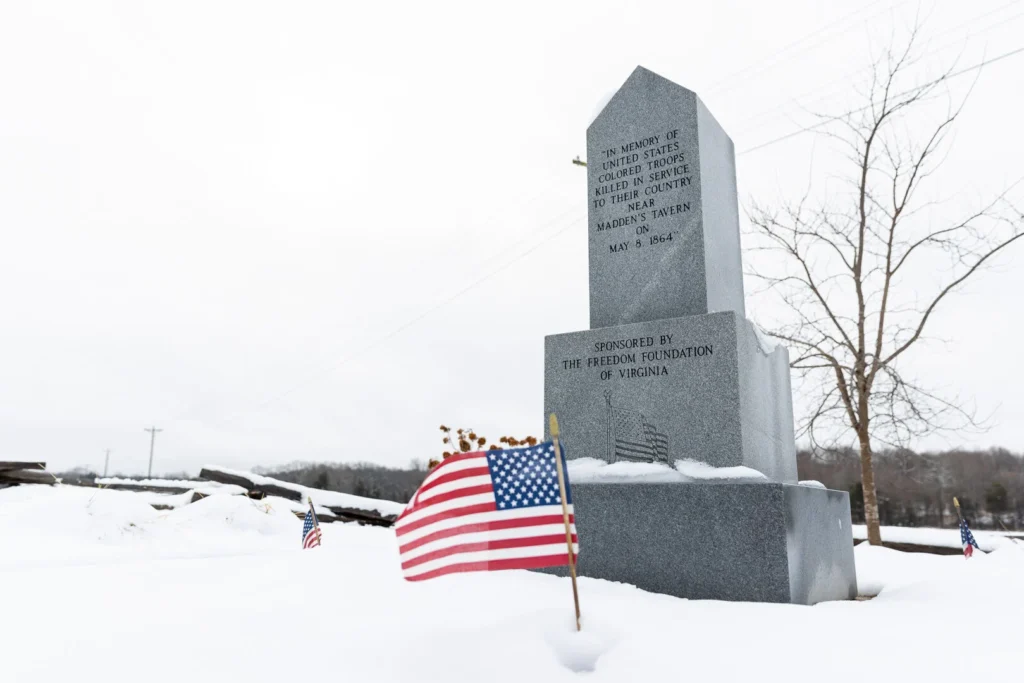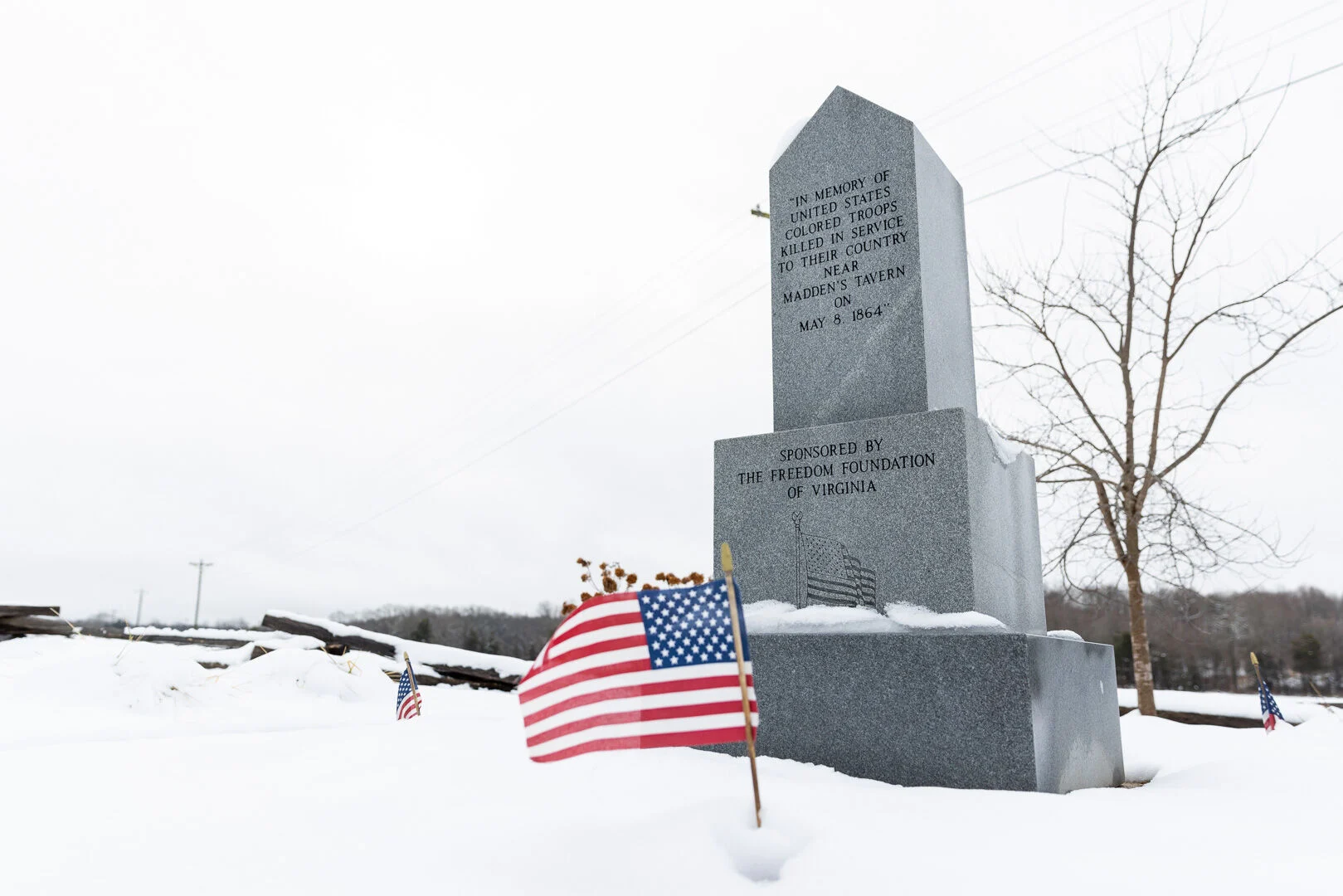Rappahannock County’s calming beauty and rolling hills hold stories from the Civil War era waiting to be told. Howard Lambert, a Culpeper native and the first African American president of the Brandy Station Foundation, has worked tirelessly to bring these stories to life, especially those of Black Civil War soldiers.
Through his lifetime efforts, historical markers now honor the often-overlooked contributions of Black soldiers, including those from Rappahannock County, ensuring their bravery and sacrifices are never forgotten. He brings Black history to life with a Civil War reenactment group he co-founded, the 54th Massachusetts Company B, that holds events with local organizations, schools and churches.
“The sacrifices of these men deserve to be remembered. They fought for the U.S. Army; they’re military veterans who deserve the dignity and respect of any other veteran who served,” he says.
Lambert, 68, as head of the Brandy Station Foundation, is actively involved in preserving one of the Civil War’s most important sites, the Brandy Station Battlefield.
He also has a personal connection to the Civil War. His great-great-uncle, Fielding Turner, served in the 20th United States Colored Troops (USCT) Infantry Regiment, fighting in pivotal battles and helping to announce emancipation in Texas — now commemorated as Juneteenth. Turner’s story of returning as a free man to the land where he was once enslaved is seen as a symbol of his perseverance.
Lambert’s interest in Civil War history deepened as a high school student after reading the story of Col. Robert Gould Shaw and the USCT 54th Massachusetts Infantry, the first African American regiment from the North to serve in the Civil War. His dedication eventually landed him a role in the movie “Glory” — an historical war film about the 54th Massachusetts Infantry. It’s where he gained firsthand experience reenacting historical events as a technical expert on set.
Lambert co-founded the African American Heritage Alliance and established the Freedom Foundation of Virginia, recognizing African Americans’ vital contributions during the Civil War and beyond and celebrating their legacy as a testament to courage and determination.
He is working to honor Charlie Wright of Culpeper, one of the first Black dispatchers during the Civil War, whose intelligence work laid the foundation for modern military strategy. In collaboration with Antioch Baptist Church of Culpeper, his organization plans to establish a memorial near Wright’s residence.

An historical marker in Culpeper County at Madden’s Tavern in Maddensville, where Black Union soldiers were executed after surrendering in 1864. Working to get the monument erected is one of Lambert’s proudest accomplishments. (Photo/Ireland Hayes)
Historical markers
One of Lambert’s proudest accomplishments with his organizations was helping to establish a historical marker at Madden’s Tavern in Culpeper County, where Black Union soldiers were executed after surrendering in 1864. “These men weren’t killed in battle; they were murdered. It’s important their sacrifice is acknowledged,” he says.
Lambert has been researching the 23rd Regiment of the USCT, which includes men from Rappahannock and Culpeper counties. In 1864, the soldiers guarded critical railroad tracks from Manassas to Orange and crossed at Kelly’s Ford. They later fought in the Battle of the Crater and witnessed Gen. Robert E. Lee’s surrender at Appomattox, marking their place in history. “Every soldier has a story,” Lambert says, and he’s committed to ensuring those stories are never forgotten.
Researching the USCT as well as tracing individuals from slavery to freedom is “a minute and challenging endeavor,” says John Hennessy, retired chief historian of the Fredericksburg & Spotsylvania National Military Park.
Organizations such as the Rappahannock Historical Society and the Carver 4-County Museum in Culpeper have been researching and preserving materials on Black Civil War soldiers.
The Rappahannock Historical Society has preserved a photograph listing over 50 Men of Color from the county who served in the Union Army during the Civil War, honoring their legacy.
Terry Miller, curator of the Carver 4-County Museum, says that in preparing for the museum’s first traveling exhibit in 2017, she had researched locally-born USCTs at the National Archives and Records Administration in Washington, D.C., and reviewed pension files.
“This research is part of our permanent collection, and we plan to digitize some materials for online access,” she says.

Lambert standing on the Brandy Station Battlefield in Culpeper County. (Photo/Ireland Hayes)
Early life in the South
Lambert’s life began in a segregated South, an experience that influenced his outlook but did not define him.
“Culpeper reflected what was happening in the greater commonwealth of Virginia,” Lambert recalls. “Segregation still existed when I was growing up. The movie theater, bus stations and restaurants were all divided.”
It wasn’t until the fourth grade that Lambert transferred to Farmington Elementary, beginning his education in an integrated system and expanding opportunities. By the 1970s, Culpeper schools were fully integrated, a shift Lambert credits as a step forward for the community.
Lambert was the middle child of a close-knit family, surrounded by love, hard work and dedicated parents, Bing and Martha, older brother Earl and younger sister Rochelle. His father worked for 43 years at Bingham & Taylor, a Culpeper foundry, while his mother raised the children before working in the culinary arts program at Culpeper County High School.
Despite the challenges of the time, Lambert fondly remembers his childhood near Mountain Run Lake, where his family lived off their garden and enjoyed his mother’s Southern cooking. His grandfather, Bing Lambert Sr. owned two properties in Orange County, including “The Proctor Place” on Clarks Mountain, once owned by Lambert’s great-grandmother, Jane Proctor. Though now owned by Aerojet Corporation, the land still holds deep meaning for Lambert, who visits the family gravesites.
After moving to Fairfax County, he discovered his new home was on the Battle of Chantilly (Ox Hill) site. This sparked a passion for preserving Civil War battlefields, leading him to advocate for the creation of the Ox Hill Battlefield Park in Fairfax County. “Every battlefield is sacred hollowed ground,” Lambert says. “Once it’s paved over, that history is lost forever.”
Lambert hopes to inspire future generations to value history and embrace their heritage as part of America’s rich tapestry.
“When you realize people’s sacrifices, it changes how you see the world,” he said. “We didn’t just till fields and grow crops. We fought, served and sacrificed for this country, too. We belong.”






